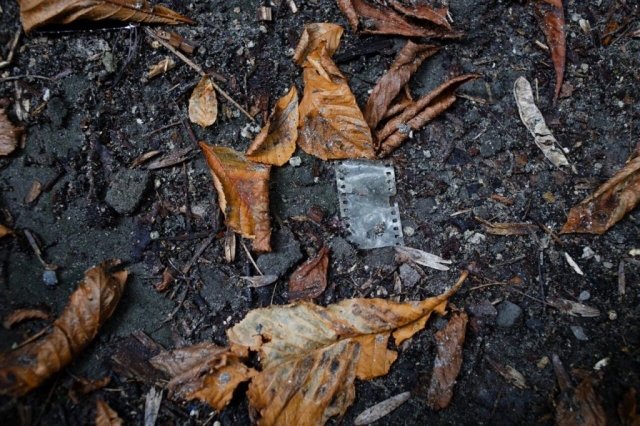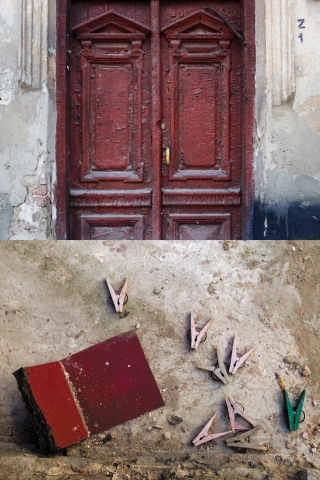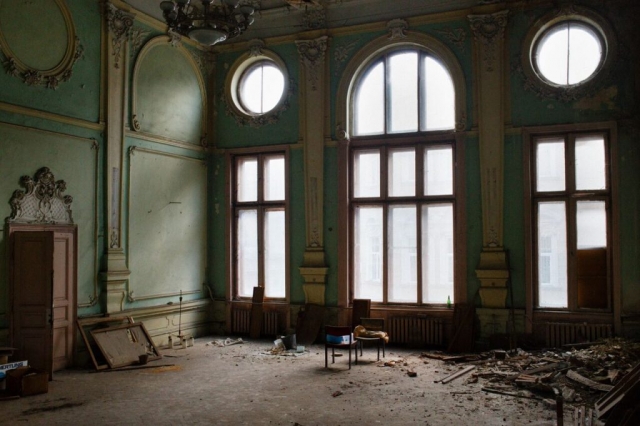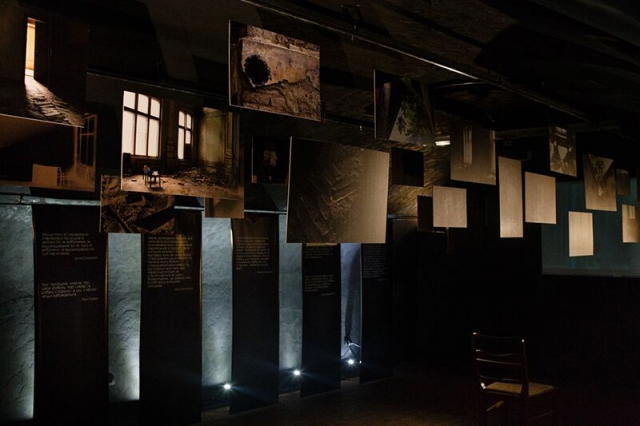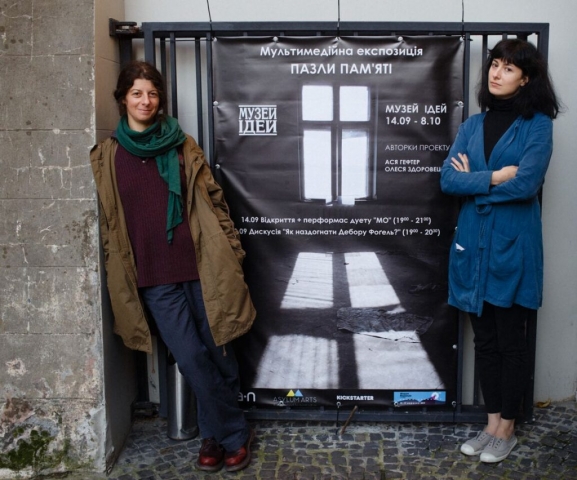
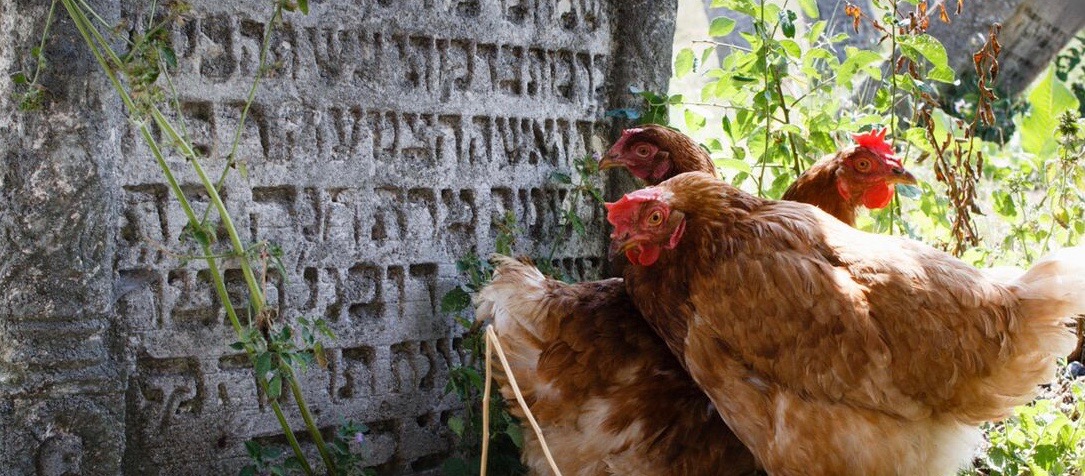
Asya Gefter: Fragments of Memory (2/2)
« Fragment of Memory » 2/2
3 / The photos you have made for the exhibition are full of poetry: your eye sees the detail and sometimes seizes a light that transfigures the object, the moment. Tell us about your pictures!
It was Lviv that educated and guided me, made me feel and experience. It felt like Vogel herself took me on a journey around Lviv and introduced to people interested in its past and present. Without open-minded, warm and knowledgeable people of Lviv I would not be able to have the freedom, the doubts and the confidence to explore.
One of the project contributors, Iryna Starovoyt (lecturer, literature critic, poet, translator) articulated Lviv’s uniqueness so eloquently: ‘This city has a neutron bomb effect: about 98% of its houses survived, while over 90% of its population, the social fabric of the city, were utterly devastated. Forceful change of borders, occupation, Holocaust and Soviet deportations have changed the population of the city. We know instinctively the meaning of the term “displaced persons”, as we here are all descendants of these people.’
In between my visits to the city I was reading books that inspired me to go back each time. I would like to quote a couple here:
“Why should everything be made clear and be brought into the light? Why keep things? Just because you have it does not mean you have to pass it on. But leaving is hard. The problem is that I am in the wrong century to burn things. I am the wrong generation to let it go. I think of all those careful burnings by others, the systematic erasing of stories, the separations between people and their possessions, and then of people from their families and families from their neighbourhoods. And then from their country.” (Edmund de Waal in ‘The Hare with Amber Eyes’).
Another Londoner, Iain Sinclair, in a very different sort of a journey ‘Liquid city’, a collaborative exploration of London’s hidden streets, cemeteries, parks and canals, observes his “random documentary impulse to sketch, note, improvise, revise, double back. For whatever reason, it seems to be important to hold on to these things”.
I struggled with piecing the narrative together. Fragments. Fractions. Layers. Traces. White spaces. I went back to Lviv in January 2017. It happened to be a super cold week. My 24hrs train journey from Moscow was quite something – Orthodox Christmas, an almost empty train carriage, icy snow on the inside of the windows. This time, in addition to taking photographs, I shot video resting my camera on the monopod which at the same time served as my walking stick wandering around snowy Lviv in the footsteps of Debora. I have explored further the concepts of melancholy, yearning, waiting, distance, empty spaces, time and memory in the city, forms and shapes in Vogel’s writings. Having climbed the stairs of my train back to Moscow, I realised it was the last carriage and so I could film leaving the Art-Nouveau Lviv Railway Station through the small murky window. It later became the opening and closing scenes of the film. The final strokes happened on my visit in May. Footage shot in two Lviv tram depots resonated with Vogel’s urban motives, roofs of Syhiv multi-storey suburbia complemented and contrasted the roofs of old Lviv shot over the previous Winter and Summer. I met Oles Dzyndra, found the common language and we agreed he would host the exhibition at the Museum of Ideas. The project was coming together!
One of the most touching things about the Lviv exhibition was the visitors’ responses and comments they leave. People shared what they felt, what it made them think about. They wrote that photographs breathed life, that the exposition unfolded in time and space. They talked about human presence they sensed in imagery. They said that we are not trying to evoke pain or guilt but show how history is helping to reinterpret Lviv as people see it now. They reflected on things I didn’t think about or didn’t notice myself. I hope this means we succeeded in creating a meaningful experience (with photographs, videos, music, texts) for the audience, that the project isn’t static and will evolve as we move forward.
Once the exhibition was over, I came across Philippe Sands with his fascinating book ‘East West Street’ and essay ‘My Lviv’. And shortly after Olesya and I took part in the fascinating event at Rich Mix London « Dash Café: Lviv on the borders of Europe » where we showed our film and discussed this city of multiple names and identities with Philippe Sands and Dr Uilleam Blacker.
More layers, more connections, more twists of fate.
4 / You participated in the Catena of Berlin. Can you tell us 2 or 3 impressions of this workshop and what does the Catena represent to you after this experience?
Given the fact my paternal grandparents were born and grew up in South Ukraine and Crimea, and my maternal grandfather fought in Western Ukraine during WWII and was stationed in Lviv after the liberation, I saw the ‘Fragments of Memory’ project as an opportunity to engage with the people of Lviv, to share my work and discuss Jewish heritage in the context of another mainstream culture. Last spring I asked Serhiy Savchenko for his advice on exhibition spaces in Lviv and he suggested the Museum of Ideas. He also invited me to join the group of artists for the Catena Roots Workshop in Berlin in July 2017, which turned out to be an unforgettable experience. I would like to stress the human kindness and openness of Berlin residents and of Ukrainian artists, the welcome we felt to be part of the Catena family. Catena has given us the space and the time to be ourselves, to meet like-minded people, to reflect on our practice, to create new work and to try new things – we were so lucky to attend lithography and silk-screen printing workshops at Kunstraum Kreuzberg/Bethanien!
The Catena workshop coupled with my research for the ‘Fragments of Memory’ project prompted me to look at my own family history. 2018 marks the 100th anniversary since my grandfather Mikhail Gefter was born in Crimea. I am eager to find out who my grandfather was beyond his philosophical and historical writings, and the internet journal Gefter.ru, an excellent Russian resource in the sphere of the social sciences and intellectual thought, named after him.
